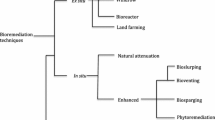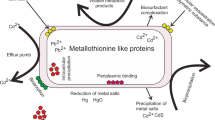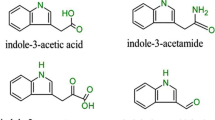Abstract
A widely used herbicide for controlling weeds, glyphosate, is causing environmental pollution. It is necessary to remove it from environment using a cost-effective and eco-friendly method. The aims of this study were to isolate glyphosate-degrading bacteria and to optimize their degradative conditions required for bioremediation. Sixteen bacterial strains were isolated through enrichment and one strain, Rhodococcus soli G41, demonstrated a high removal rate of glyphosate than other strains. Response surface methodology was employed to optimize distinct environmental factors on glyphosate degradation of G41 strain. The optimal conditions for the maximum glyphosate degradation were found to have the NH4Cl concentration of 0.663% and glyphosate concentration of 0.115%, resulting in a maximum degradation of 42.7% after 7 days. Bioremediation analysis showed 47.1% and 40% of glyphosate in unsterile soil and sterile soil was removed by G41 strain after 14 days, respectively. The presence of soxB gene in G41 strain indicates that the glyphosate is degraded via the eco-friendly sarcosine pathway. The results indicated that G41 strain has the potential to serve as an in-situ candidate for bioremediation of glyphosate polluted environments.



Similar content being viewed by others
References
Bhaskara BL, Nagaraja P (2006) Direct sensitive spectrophotometric determination of glyphosate by using ninhydrin as a chromogenic reagent in formulations and environmental water samples. Helv Chim Acta 89:2686–2693
Brain RA, Solomon KR (2009) Comparison of the hazards posed to amphibians by the glyphosate spray control program versus the chemical and physical activities of coca production in Colombia. J Toxicol Environ Health A 72:937–948. https://doi.org/10.1080/15287390902929683
Duke SO, Powles SB (2008) Glyphosate: a once-in-a-century herbicide. Pest Manag Sci 64:319–325. https://doi.org/10.1002/ps.1518
Echavia GR, Matzusawa F, Negishi N (2009) Photocatalytic degradation of organophosphate and phosphonoglycine pesticides using TiO2 immobilized on silica gel. Chemosphere 76:595–600. https://doi.org/10.1016/j.chemosphere.2009.04.055
Ermakova IT, Kiseleva NI, Shushkova T, Zharikov M, Zharikov GA, Leontievsky AA (2010) Bioremediation of glyphosate-contaminated soils. Appl Microbiol Biotechnol 88:585–594. https://doi.org/10.1007/s00253-010-2775-0
Fan J et al (2012) Isolation, identification and characterization of a glyphosate-degrading bacterium, Bacillus cereus CB4, from soil. J Gen Appl Microbiol 58:263–271. https://doi.org/10.2323/jgam.58.263
Firdous S, Iqbal S, Anwar S, Jabeen H (2018) Identification and analysis of 5-enolpyruvylshikimate-3-phosphate synthase (EPSPS) gene from glyphosate-resistant Ochrobactrum intermedium Sq20. Pest Manag Sci 74:1184–1196. https://doi.org/10.1002/ps.4624
Firdous S, Iqbal S, Anwar S (2020) Optimization and modeling of glyphosate biodegradation by a novel Comamonas odontotermitis P2 through response surface methodology. Pedosphere 30:618–627
Hadi F, Mousavi A, Noghabi KA, Tabar HG, Salmanian AH (2013) New bacterial strain of the genus Ochrobactrum with glyphosate-degrading activity. J Environ Sci Health B 48:208–213. https://doi.org/10.1080/03601234.2013.730319
Kryuchkova YV et al (2014) Isolation and characterization of a glyphosate-degrading rhizosphere strain, Enterobacter cloacae K7. Microbiol Res 169:99–105. https://doi.org/10.1016/j.micres.2013.03.002
Li H, Joshi SR, Jaisi DP (2016) Degradation and isotope source tracking of glyphosate and aminomethylphosphonic acid. J Agric Food Chem 64:529–538. https://doi.org/10.1021/acs.jafc.5b04838
Manassero A, Passalia C, Negro AC, Cassano AE, Zalazar CS (2010) Glyphosate degradation in water employing the H2O2/UVC process. Water Res 44:3875–3882. https://doi.org/10.1016/j.watres.2010.05.004
Manogaran M, Shukor MY, Yasid NA, Khalil KA, Ahmad SA (2018) Optimisation of culture composition for glyphosate degradation by Burkholderia vietnamiensis strain AQ5-12. 3 Biotech 8:108. https://doi.org/10.1007/s13205-018-1123-4
McAuliffe KS, Hallas LE, Kulpa CF (1990) Glyphosate degradation by Agrobacterium radiobacter isolated from activated sludge. J Ind Microbiol 6:219–221. https://doi.org/10.1007/BF01577700
Mesnage R, Defarge N, Spiroux de Vendomois J, Seralini GE (2015) Potential toxic effects of glyphosate and its commercial formulations below regulatory limits. Food Chem Toxicol 84:133–153. https://doi.org/10.1016/j.fct.2015.08.012
Nagy K et al (2020) Systematic review of comparative studies assessing the toxicity of pesticide active ingredients and their product formulations. Environ Res 181:108926. https://doi.org/10.1016/j.envres.2019.108926
Nguyen NT (2018) Acinetobacter soli SP2 capable of high-efficiency degradation of food emulsifier polysorbate 80. Curr Microbiol 75:896–900. https://doi.org/10.1007/s00284-018-1463-7
Nguyen NT, Pham TTT, Tran TN, Kumar VB, Saikia S, Kiefer R (2021) Identification and biodegradation potential of a novel strain of Kosakonia oryzae isolated from a polyoxyethylene tallow amine paddy soil. Curr Microbiol 78:3173–3180. https://doi.org/10.1007/s00284-021-02592-9
Obojska A, Lejczak B, Kubrak M (1999) Degradation of phosphonates by streptomycete isolates. Appl Microbiol Biotechnol 51:872–876. https://doi.org/10.1007/s002530051476
Obojska A, Ternan NG, Lejczak B, Kafarski P, McMullan G (2002) Organophosphonate utilization by the thermophile Geobacillus caldoxylosilyticus T20. Appl Environ Microbiol 68:2081–2084. https://doi.org/10.1128/AEM.68.4.2081-2084.2002
Parra-Arroyo L et al (2022) Highly hazardous pesticides and related pollutants: toxicological, regulatory, and analytical aspects. Sci Total Environ 807:151879. https://doi.org/10.1016/j.scitotenv.2021.151879
Reyes-Calderon A et al (2022) Analytical and regulatory considerations to mitigate highly hazardous toxins from environmental matrices. J Hazard Mater 423:127031. https://doi.org/10.1016/j.jhazmat.2021.127031
Saeed MU et al (2021) Microbial bioremediation strategies with wastewater treatment potentialities—a review. Sci Total Environ. https://doi.org/10.1016/j.scitotenv.2021.151754
Sharma A et al (2022) Green remediation potential of immobilized oxidoreductases to treat halo-organic pollutants persist in wastewater and soil matrices—a way forward. Chemosphere 290:133305. https://doi.org/10.1016/j.chemosphere.2021.133305
Singh S, Kumar V, Singh J (2019) Kinetic study of the biodegradation of glyphosate by indigenous soil bacterial isolates in presence of humic acid, Fe(III) and Cu(II) ions. J Environ Chem Eng 7:103098
Tuan NN, Hsieh HC, Lin YW, Huang SL (2011) Analysis of bacterial degradation pathways for long-chain alkylphenols involving phenol hydroxylase, alkylphenol monooxygenase and catechol dioxygenase genes. Bioresour Technol 102:4232–4240. https://doi.org/10.1016/j.biortech.2010.12.067
Yu XM et al (2015) Glyphosate biodegradation and potential soil bioremediation by Bacillus subtilis strain Bs-15. Genet Mol Res 14:14717–14730. https://doi.org/10.4238/2015.November.18.37
Zhan H, Feng Y, Fan X, Chen S (2018) Recent advances in glyphosate biodegradation. Appl Microbiol Biotechnol 102:5033–5043. https://doi.org/10.1007/s00253-018-9035-0
Funding
The authors have not disclosed any funding.
Author information
Authors and Affiliations
Corresponding author
Ethics declarations
Conflict of interest
The authors have not disclosed any competing interests.
Additional information
Communicated by El-Sayed R.
Publisher's Note
Springer Nature remains neutral with regard to jurisdictional claims in published maps and institutional affiliations.
Supplementary Information
Below is the link to the electronic supplementary material.
Rights and permissions
About this article
Cite this article
Nguyen, N.T., Vo, V.T., Nguyen, T.H.P. et al. Isolation and optimization of a glyphosate-degrading Rhodococcus soli G41 for bioremediation. Arch Microbiol 204, 252 (2022). https://doi.org/10.1007/s00203-022-02875-0
Received:
Revised:
Accepted:
Published:
DOI: https://doi.org/10.1007/s00203-022-02875-0




